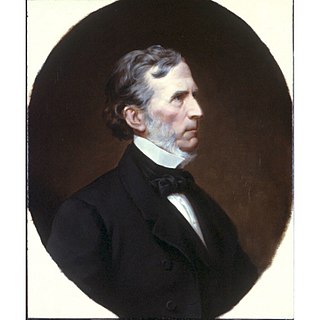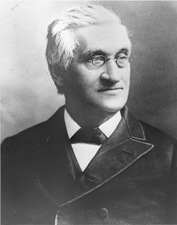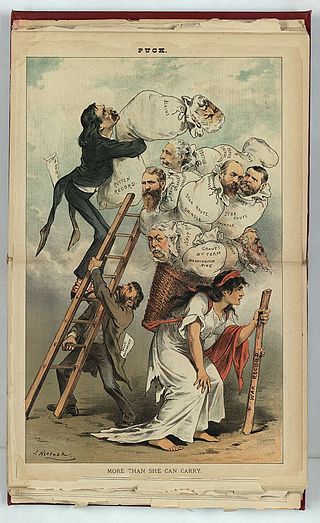Related Research Articles
The Joint Committee on the Conduct of the War was a United States congressional committee started on December 9, 1861, and was dismissed in May 1865. The committee investigated the progress of the American Civil War against the Confederacy. Meetings were held in secret, but reports were issued from time to time.

The Joint Committee on Reconstruction, also known as the Joint Committee of Fifteen, was a joint committee of the 39th United States Congress that played a major role in Reconstruction in the wake of the American Civil War. It was created to "inquire into the condition of the States which formed the so-called Confederate States of America, and report whether they, or any of them, are entitled to be represented in either house of Congress.”

The 1860–61 United States House of Representatives elections were held on various dates in various states between August 6, 1860, and October 24, 1861, before or after the first session of the 37th United States Congress convened on July 4, 1861. The number of House seats initially increased to 239 when California was apportioned an extra one, but these elections were affected by the outbreak of the American Civil War and resulted in over 56 vacancies.

The U.S. House Committee on Ethics, often known simply as the Ethics Committee, is one of the committees of the United States House of Representatives. Before the 112th Congress, it was known as the Committee on Standards of Official Conduct.

The 38th United States Congress was a meeting of the legislative branch of the United States federal government, consisting of the United States Senate and the United States House of Representatives. It met in Washington, D.C., from March 4, 1863, to March 4, 1865, during the last two years of President Abraham Lincoln's first term in office. The apportionment of seats in the House of Representatives was based on the 1860 United States census. The Senate had a Republican majority, and the House of Representatives had a Republican plurality; Republicans controlled the House by sharing a coalition with Unconditional Unionists.

The 37th United States Congress was a meeting of the legislative branch of the United States federal government, consisting of the United States Senate and the United States House of Representatives. It met in Washington, D.C., from March 4, 1861, to March 4, 1863, during the first two years of Abraham Lincoln's presidency. The apportionment of seats in the House of Representatives was based on the 1850 United States census.

The 40th United States Congress was a meeting of the legislative branch of the United States federal government, consisting of the United States Senate and the United States House of Representatives. It met in Washington, D.C. from March 4, 1867, to March 4, 1869, during the third and fourth years of Andrew Johnson's presidency. The apportionment of seats in the House of Representatives was based on the 1860 United States census. Both chambers had a Republican majority. In the Senate, the Republicans had the largest majority a party has ever held.
The Joint Committee on Taxation (JCT) is a Committee of the U.S. Congress established under the Internal Revenue Code at 26 U.S.C. § 8001.
Congressional oversight is oversight by the United States Congress over the executive branch, including the numerous U.S. federal agencies. Congressional oversight includes the review, monitoring, and supervision of federal agencies, programs, activities, and policy implementation. Congress exercises this power largely through its congressional committee system. Oversight also occurs in a wide variety of congressional activities and contexts. These include authorization, appropriations, investigative, and legislative hearings by standing committees; which is specialized investigations by select committees; and reviews and studies by congressional support agencies and staff.

Charles Henry Van Wyck was a Representative from New York, a Senator from Nebraska, and a Union Army brigadier general in the American Civil War.

Laura Richardson is an American politician who has served as a member of the California State Senate from the 35th district since 2024. A member of the Democratic Party, she previously served as the U.S. representative for California's 37th congressional district from 2007 to 2013.

The impeachment of Andrew Johnson was initiated on February 24, 1868, when the United States House of Representatives passed a resolution to impeach Andrew Johnson, the 17th president of the United States, for "high crimes and misdemeanors". The alleged high crimes and misdemeanors were afterwards specified in eleven articles of impeachment adopted by the House on March 2 and 3, 1868. The primary charge against Johnson was that he had violated the Tenure of Office Act. Specifically, that he had acted to remove Edwin Stanton from the position of Secretary of War and to replace him with Brevet Major General Lorenzo Thomas as secretary of war ad interim. The Tenure of Office Act had been passed by Congress in March 1867 over Johnson's veto with the primary intent of protecting Stanton from being fired without the Senate's consent. Stanton often sided with the Radical Republican faction and had a good relationship with Johnson.

Bethuel Middleton Kitchen was a nineteenth-century politician from Virginia and West Virginia.

The Star Route scandal was a political scandal in the United States, stemming from allegations of bribery and bid rigging in the United States Post Office Department which came to light as early as 1872 and which were the focus of public scrutiny following the election of President James A. Garfield. There were no fewer than four federal investigations into bribery in the postal service from 1872 through 1883. The scandal and public reaction to it contributed to the passage of the Pendleton Civil Service Reform Act.
Expulsion is the most serious form of disciplinary action that can be taken against a member of Congress. The United States Constitution provides that "Each House [of Congress] may determine the Rules of its proceedings, punish its members for disorderly behavior, and, with the concurrence of two-thirds, expel a member." The process for expulsion from the House of Representatives differs somewhat from the process for expulsion from the Senate.
The Committee on an Alleged Abstraction of a Report from the Clerk's Office was a short-lived select committee of the United States House of Representatives appointed to investigate the disappearance of a committee report from the House Clerk's office. The committee existed for less than one day, having been appointed on March 3, 1863, shortly before the 37th Congress adjourned sine die.

The Habeas Corpus Suspension Act, 12 Stat. 755 (1863), entitled An Act relating to Habeas Corpus, and regulating Judicial Proceedings in Certain Cases, was an Act of Congress that authorized the president of the United States to suspend the right of habeas corpus in response to the American Civil War and provided for the release of political prisoners. It began in the House of Representatives as an indemnity bill, introduced on December 5, 1862, releasing the president and his subordinates from any liability for having suspended habeas corpus without congressional approval. The Senate amended the House's bill, and the compromise reported out of the conference committee altered it to qualify the indemnity and to suspend habeas corpus on Congress's own authority. Abraham Lincoln signed the bill into law on March 3, 1863, and suspended habeas corpus under the authority it granted him six months later. The suspension was partially lifted with the issuance of Proclamation 148 by Andrew Johnson, and the Act became inoperative with the end of the Civil War. The exceptions to Johnson's Proclamation 148 were the States of Virginia, Kentucky, Tennessee, North Carolina, South Carolina, Georgia, Florida, Alabama, Mississippi, Louisiana, Arkansas, and Texas, the District of Columbia, and the Territories of New Mexico and Arizona.

Mark Randall Meadows is an American politician who served as the 29th White House chief of staff from 2020 to 2021 under the Trump administration. A member of the Republican Party, he also served as the U.S. representative for North Carolina's 11th congressional district from 2013 to 2020. During his legislative tenure, Meadows chaired the Freedom Caucus from 2017 to 2019. He was considered one of Donald Trump's closest allies in the House of Representatives before his appointment as chief of staff.
References
- 1 2 3 4 5 6 7 8 9 Bolles, Albert S. (1886). The Financial History of the United States from 1861 to 1885. New York: D. Appelton and Company. pp. 230–235.
- 1 2 Economy and Efficiency in the Government Service, Document No. 670. 62nd Congress, 2nd session. Washington, D.C.: United States House of Representatives. 1912. p. 445.
- ↑ U.S. House Journal. 37th Congress, 1st session. 8 July 1861, 45
- 1 2 U.S. House Journal. 37th Congress, 1st session. 17 July 1861, 98
- ↑ The Congressional Globe. 37th Congress, 1st session. 17 July 1861, 168-171
- ↑ U.S. House Journal. 37th Congress, 1st session. 12 July 1861, 71
- 1 2 3 4 5 The Congressional Globe. 37th Congress, 3rd session. 3 March 1863, 1549-1551
- ↑ U.S. House Journal. 37th Congress, 2nd session. 17 December 1861, 83
- ↑ The Congressional Globe. 37th Congress, 2nd session. 17 December 1861, 116-118
- ↑ The Congressional Globe (March 3), Page 1546
- ↑ 12 Stat. 411
- ↑ Cong Globe June 3, 1862, page 2506
- ↑ 12 Stat. 600